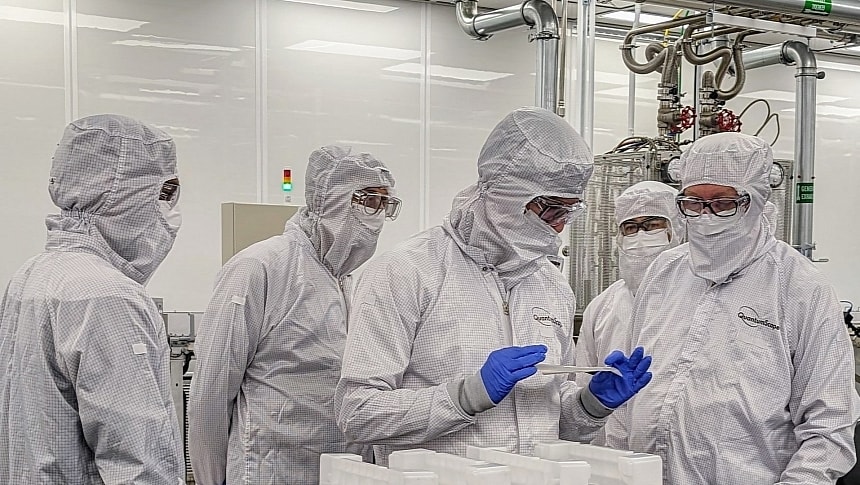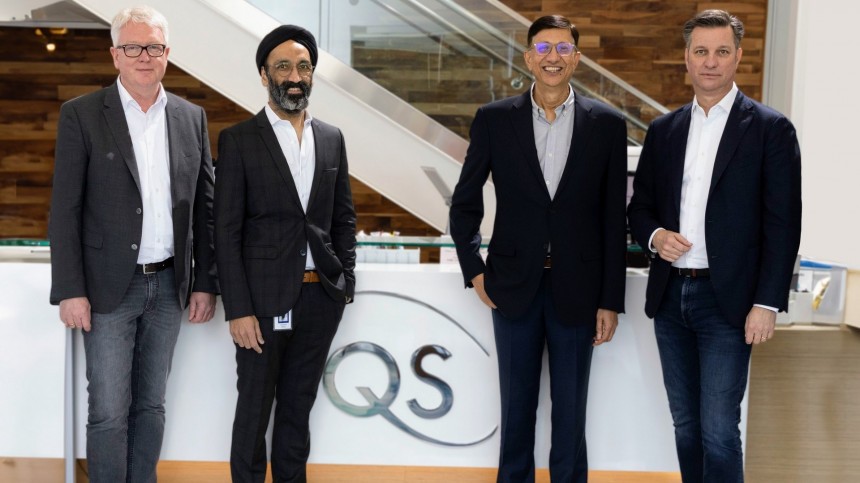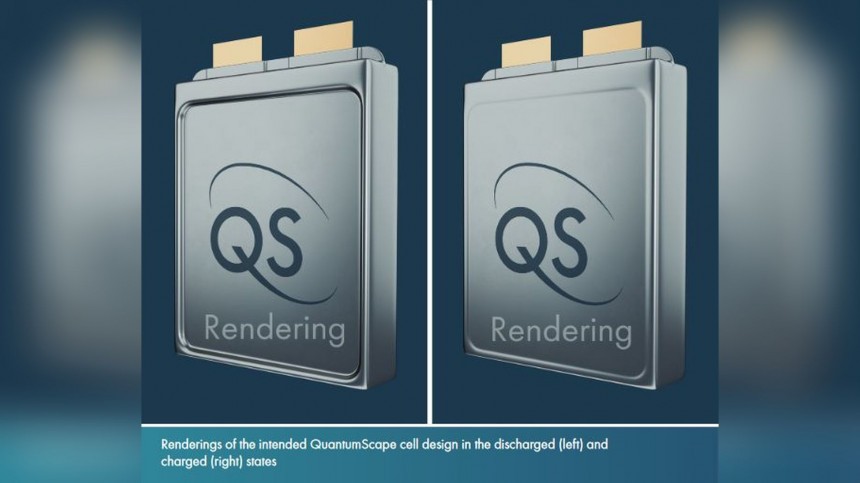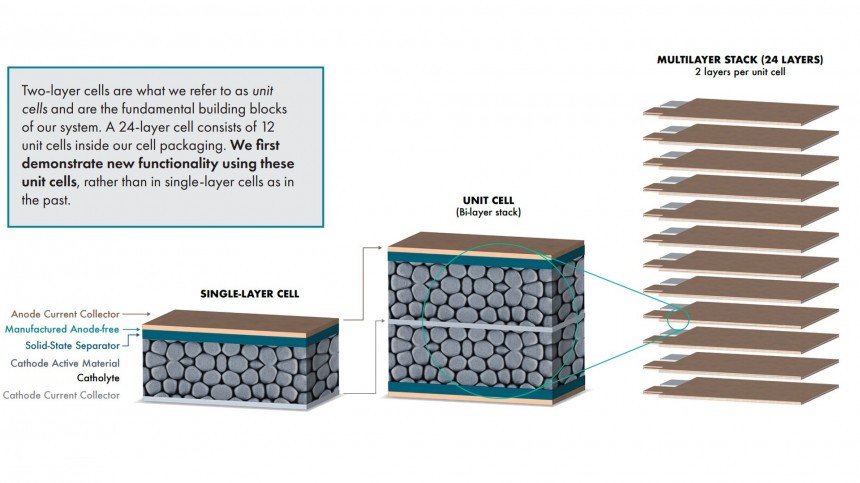In journalism, there are a few basic questions you have to answer to deliver a complete story. We're talking about "what," "who," "where," "when," "how," and "why." Well, QuantumScape and Volkswagen disclosed a new deal to produce solid-state batteries (SSBs). There you have the "who" and the "what," but all other answers, some of the most crucial ones, are still pending, especially considering these companies already had a deal for that, which is now old news.
In March 2021, both companies announced a joint venture that would create QuantumScape's second factory, QS-1. It would be the first one producing the startup's solid-state cells at a commercial scale. The deal announced today states that PowerCo, Volkswagen's battery branch, will manufacture the SSBs on its own, a new arrangement that "supersedes" the previous one. For that, it will pay QuantumScape $130 million in royalties "upon satisfactory technological progress." Great news? That depends on "who."
For Volkswagen, this may be fantastic. It will not have to wait for QuantumScape to deliver the cells it needs. For car buyers, this may also mean the SSBs will be in a production vehicle as soon as possible. For QuantumScape, on the other hand, this does not seem to be as positive as the $130 million it received may suggest.
Here comes the "why" that neither company has disclosed. If the previous deal was going well, why change it after most tests with the battery seem to have been successful? Perhaps QuantumScape could not invest as much in the plant as Volkswagen wanted. The QS-1 was supposed to have an initial battery output of 1 GWh per year, which could be expanded to 20 GWh more in the same location. The new deal shows this is not enough for Volkswagen's plans.
PowerCo will be able to produce 40 GWh per year in QuantumScape's SSBs, a capacity it can double. According to the companies, 80 GWh is enough to power 1 million electric cars per year. That means vehicles with these cells should have battery packs of around 80 kWh. The idea of having automobiles with smaller battery packs that can be recharged faster will only be feasible when prices for these cells drop. High-scale production is the best way to get there.
Volkswagen's rush is also clear in the press release. According to it, "the companies believe this high-touch engagement represents the fastest way to achieve gigawatt-hour-scale production of solid-state technology to meet the growing global demand for better electric vehicle batteries." Their careful choice of words also deserves our attention.
When they talk about a "growing global demand," it may give the impression that battery electric vehicle (BEV) sales are improving, but what comes next is revealing: the higher demand is "for better electric vehicle batteries." Volkswagen knows ternary cells, with their current technology, are not something customers crave, either because of their thermal runaway risks or their cost and durability. For its electrification plans to work, it needs safer and more durable cells. QuantumScape seems to have provided that.
So, part of "why" is that Volkswagen wants these cells in its cars as soon as possible. The other part seems to be the fact that QuantumScape is still developing ways to manufacture these cells at reasonable costs. This is their main challenge, more than the tech itself. It may be the case that QuantumScape is taking too long to do so. Sadly, neither company revealed "when." QS-1 was expected to start operating in 2024. If what we have in July 2024 is a new deal instead of production lines operating, that is another sign that one of the partners was not delivering as expected.
In May 2021, QuantumScape announced it had hired Celina Mikolajczak as its vice president for manufacturing engineering. In June 2022, she resigned due to "differing management styles," according to the filing with the US Securities and Exchange Commission (SEC) that informed about the change. It would not surprise anyone if the joint venture between QuantumScape and Volkswagen did not work for the same reason.
Whatever the "why" was, the companies will stick together. Volkswagen is a major investor in the American startup, and QuantumScape has something that the German automaker desperately needs. If the best way to make this partnership work was for them to be more independent, so be it. I have asked QuantumScape for the missing answers and will either update or write a new article with what the company provides.
The questions from now on will be a bit different. Will Volkswagen manage to manufacture these SSBs at a feasible cost? It certainly has loads of experience with mass production, but only when we talk about cars. As far as we know, the German company never made batteries, especially lithium-ion cells, which demand extra care. GM's and Hyundai's issues with their LG Energy Solution (LGES) batteries show how serious this is.
The companies said QuantumScape would assist Volkswagen in the process. Whether the startup will be able to apply the manufacturing solutions it develops with the German automaker to its independent endeavors (to sell SSBs to other carmakers) is another question that needs to be addressed.
For Volkswagen, this may be fantastic. It will not have to wait for QuantumScape to deliver the cells it needs. For car buyers, this may also mean the SSBs will be in a production vehicle as soon as possible. For QuantumScape, on the other hand, this does not seem to be as positive as the $130 million it received may suggest.
PowerCo will be able to produce 40 GWh per year in QuantumScape's SSBs, a capacity it can double. According to the companies, 80 GWh is enough to power 1 million electric cars per year. That means vehicles with these cells should have battery packs of around 80 kWh. The idea of having automobiles with smaller battery packs that can be recharged faster will only be feasible when prices for these cells drop. High-scale production is the best way to get there.
Volkswagen's rush is also clear in the press release. According to it, "the companies believe this high-touch engagement represents the fastest way to achieve gigawatt-hour-scale production of solid-state technology to meet the growing global demand for better electric vehicle batteries." Their careful choice of words also deserves our attention.
So, part of "why" is that Volkswagen wants these cells in its cars as soon as possible. The other part seems to be the fact that QuantumScape is still developing ways to manufacture these cells at reasonable costs. This is their main challenge, more than the tech itself. It may be the case that QuantumScape is taking too long to do so. Sadly, neither company revealed "when." QS-1 was expected to start operating in 2024. If what we have in July 2024 is a new deal instead of production lines operating, that is another sign that one of the partners was not delivering as expected.
In May 2021, QuantumScape announced it had hired Celina Mikolajczak as its vice president for manufacturing engineering. In June 2022, she resigned due to "differing management styles," according to the filing with the US Securities and Exchange Commission (SEC) that informed about the change. It would not surprise anyone if the joint venture between QuantumScape and Volkswagen did not work for the same reason.
The questions from now on will be a bit different. Will Volkswagen manage to manufacture these SSBs at a feasible cost? It certainly has loads of experience with mass production, but only when we talk about cars. As far as we know, the German company never made batteries, especially lithium-ion cells, which demand extra care. GM's and Hyundai's issues with their LG Energy Solution (LGES) batteries show how serious this is.
The companies said QuantumScape would assist Volkswagen in the process. Whether the startup will be able to apply the manufacturing solutions it develops with the German automaker to its independent endeavors (to sell SSBs to other carmakers) is another question that needs to be addressed.



















